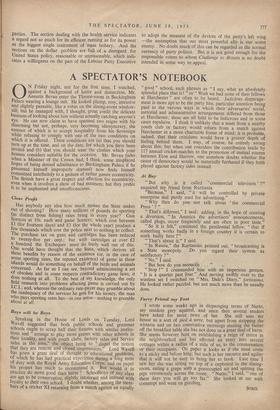Boys will be Boys Speaking in the House of Lords
on Tuesday, Lord Wavell suggested that both public schools and grammar schools ought to scrap half their fixtures with similar institu- tions and " arrange to play more games with other schools in their locality, and with youth clubs, factory sides and Service sides in the area," the object being to " dispel the notion that they are remote and closed communities." Lord Wavell has given a great deal of thought to educational problems, of which he has had practical experience during a long term of duty with the Royal Army Education Corps; and on paper his project has much to recommend it. But would it in practice do more good than harm ? Schoolboys of any class are apt to be conservative, slightly intolerant and imbued with loyalty to their own school. I doubt whether, among the mem- bers of a cricket XI returning from a match against an equally " good " school, such phrases as " I say, what an absolutely splendid place that is! " or " Wish we had some of their fellows at Harchester " are often to be heard. Judicious disparage- ment is more apt to be the party line, particular attention being paid to the various ways in which their adversaries' social, sartorial and administrative arrangements differed from those at Harchester; these are all held to be ludicrous and in some cases repulsive. I think it unlikely that a team from a nearby youth club or factory would return from a match against Harchester in a more charitable frame of mind; it is probable, indeed, that their criticisms would have a greater depth of feeling behind them. I may, of course, be entirely wrong about this; but when one considers the contribution made by 117 annual cricket-matches to the promotion of mutual esteem between Eton and Harrow, one somehow doubts whether the cause of democracy would be materially furthered if they both played against factory sides instead.


















































 Previous page
Previous page